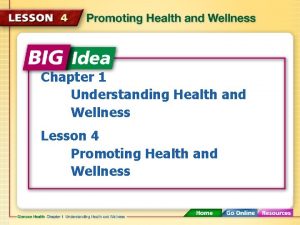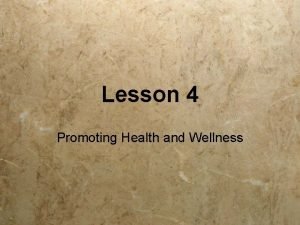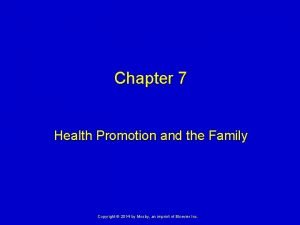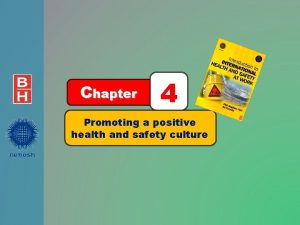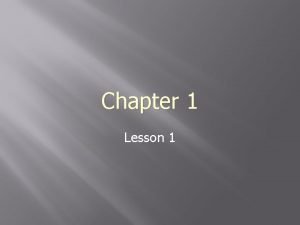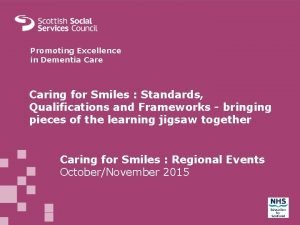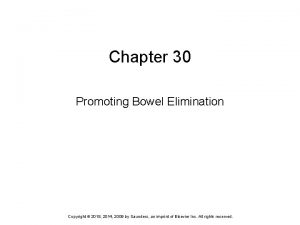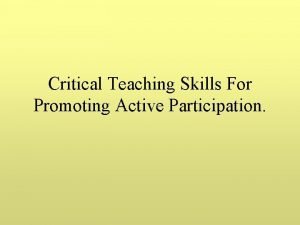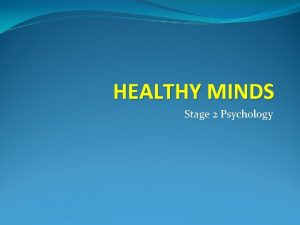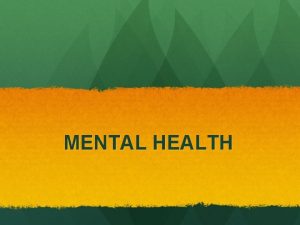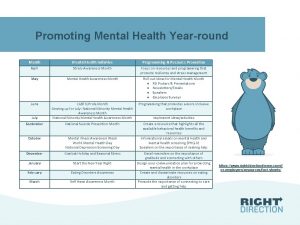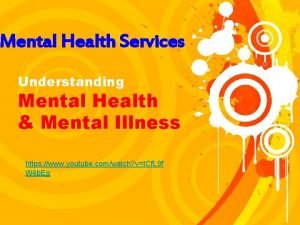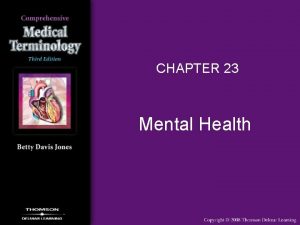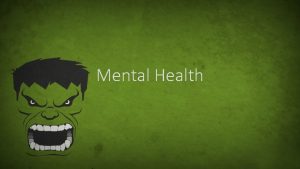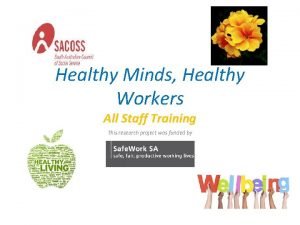Healthy Minds Healthy Lives Promoting Mental Health for




































- Slides: 36

Healthy Minds, Healthy Lives: Promoting Mental Health for People with Developmental/Intellectual Disabilities Presented by Barbara T. Doyle, MS

What We Will Consider □ What role does mental health play in our lives? How important is mental health? □ What could harm or damage mental health? □ What promotes mental health? □ What are some mentally healthy skills? □ What can we do to calm ourselves and quiet our minds? □ What should we stop doing… □ What should we start doing… Barbara T. Doyle, MS 2

What We Will Not Cover □ How to diagnose and treat mental health disorders or mental illness □ Use of prescription medications to treat mental health disorders or mental illness □ We do not want to practice medicine without a license! Barbara T. Doyle, MS 3

Who Are We Talking About? □ Everyone, everywhere, all the time □ Things that support anyone’s mental health will likely support everyone’s mental health regardless of developmental/intellectual diagnoses □ Things that harm anyone’s mental health will likely harm people with disabilities □ There is no US and THEM, there is only one, big US! Barbara T. Doyle, MS 4

Definitions of Mental Health Mental health includes our emotional, psychological, and social well-being. It affects how we think, feel, and act. It also helps determine how we handle stress, relate to others, and make choices. From Mental Health. gov Barbara T. Doyle, MS 5

Definitions of Mental Health Mental health is not just the absence of mental disorder. It is defined as a state of well-being in which every individual realizes his or her own potential, can cope with the normal stresses of life, can work productively and fruitfully, and is able to make a contribution to her or his community…a sense of connection is vital. from the World Health Organization Barbara T. Doyle, MS 6

All The Time? □ Mentally healthy people can have mental health problems from time to time. (When? Under what conditions? ) □ Their overall mental health remains intact and recovers from circumstances that had an impact □ They can recognize the need for help and seek help when needed. This is important to teach! Barbara T. Doyle, MS 7

Barbara T. Doyle, MS

Three Important Mental Health Skills □ Self-awareness: identifying and responding adaptively to your state of mind, body, thinking, mood and behavior, and own level of arousal □ Self-knowledge: knowing strengths and needs, what one can tolerate, what needs to be avoided, strategies to change level of arousal, and what others need to do to help you □ Self-advocacy: constructive, positive, means to meet your needs by letting others know what you need, telling others what you need, asking others to change what they are doing, getting needed supports Barbara T. Doyle, MS 9

The Assumption of Competence Assume that there is always more “internal life” in a human being than what they are able to show us, even when they are babies and little children, even when they have lots of “Ds, ” even when they cannot speak or perform according to an age expectation. “I’ve always been in here. ” Barbara T. Doyle, MS 10

Positive Affirmations "Positive Affirmations …are usually short, positive, statements targeted at a specific subconscious set of beliefs, to challenge and undermine negative beliefs and to replace them with positive self-nurturing beliefs. ” From http: //www. vitalaffirmations. com/affirmations. htm#creating affirmations Barbara T. Doyle, MS 11

Why Do We Need Positive Affirmation? □ If you have a disability, people have probably talked about your deficits in front of you and others your whole life! □ You have likely been corrected, punished, coerced, embarrassed, humiliated, deprived, and medicated in efforts to “control” your behavior. □ You may have “disappointed” parents, teachers and others □ You have likely been compared to others and to “normal. ” □ You may have been traumatized along the way! □ Most of this happens even if no one intended to harm! Barbara T. Doyle, MS 12

The Role of Positive Affirmations □ Create affirmations to combat negative thoughts the person may be thinking about themselves as a result of their lifelong experiences □ Create affirmations the person may like and enjoy saying/thinking/hearing/seeing □ Write them down, post them, and leave notes or cards around to notice throughout the day to read/say them to the person □ Include the person in making them if possible. Barbara T. Doyle, MS 13

Assume Competence to Create Positive Affirmations □ I am smart. I can learn. I have learned many things. □ I am nice. People like me. (list people) □ People love me. (list the people) □ I am helpful. I like to help other people. □ I am with other people who want to help me. □ I am gentle. I touch others gently. □ What else? Create five positive affirmations right now for someone. (Don’t violate confidentiality. ) Barbara T. Doyle, MS 14

The Importance of Quieting the Mind □ Mindfulness training: what is it and what can it do? □ Our busy minds lead to anxiety, depression and feeling overwhelmed □ Yoga and meditation can help □ Simply observing a person with a quiet mind and expanded breathing can quiet others! Barbara T. Doyle, MS 15

Teaching Quieting the Mind □ Simple, one-minute exercises can help everyone □ Experience a quieting minute with me □ What do you think? Is this useful? □ How can YOU use this technique? Barbara T. Doyle, MS 16

Resources for Mindfulness Training Developed by a man with Asperger Syndrome How to quiet the mind: breathing, learning mindfulness, and the awareness minute http: //www. jkp. com/blog/2011/01/art-chris-mitchellaspergers-syndrome-and-mindfulness/ Barbara T. Doyle, MS 17

Children’s Books on Mindfulness http: //www. jkp. com/catalogue/book/9781848 190917 Frog's Breathtaking Speech How Children (and Frogs) Can Use Yoga Breathing to Deal with Anxiety, Anger and Tension by Michael Chissick Illustrated by Sarah Peacock Barbara T. Doyle, MS 18

If we always do what we have always done, we will always get what we have always gotten. Barbara T. Doyle, MS 19

What Should We Stop Doing? □ Stop using fear, shame, humiliation, comparisons, sharing private information and guilt as “tools” to change people’s behavior. □ Stop attending to “how” people express themselves instead of getting “the message. ” □ Stop telling people to “mind their own business. ” □ What else? Barbara T. Doyle, MS 20

What Should We Teach People? □ to create and use positive affirmations □ to recognize their talents and use them to their advantage □ to recognize the need for self-calming strategies and how to use them □ to recognize when they need help and get help successfully □ to express emotions in a healthy, safe way (even if loud!) □ What else? Barbara T. Doyle, MS 21

What Should We Start Doing? □ Be more kind and empathetic (has anyone ever been “too kind” to you? ) □ Tell people of all ages to “snitch. ” □ Recognize the profile of the person with mental health needs and bringing this to the attention of other professionals. □ Secure more mental health supports for our populations. Barbara T. Doyle, MS 22

What Should We Start Doing? □ Provide more supervision to people with disabilities when in groups of moving people: gym, bathrooms, outdoors, hallways, lunchroom, large events, etc. □ Without our supervision, these become places that PERMIT the abuse of people with disabilities. □ Teach people with disabilities to identify and report abuse, not to “learn to deal with it” or “stand up for yourself. ” □ Learn about past traumas the person has experienced. Barbara T. Doyle, MS 23

Add this to your notes □ http: //learningcurve. fmhi. usf. edu/docs/CARD_ASDMH_Brochure_final_092109. pdf □ Wonderful handout with descriptions of mental health issues and intervention strategies for people with autism spectrum disorder. Barbara T. Doyle, MS 24

Resources to substantiate the need for more counselors etc □ http: //www. nami. org/Content. Groups/Press_Ro om 1/20122/December 19/NAMI_Fact_Sheet_After_the_ Newtown_Tragedy, _Parents_are_Asking_What_to_Do _When_a_Child_Has_a_Mental_I. htm Barbara T. Doyle, MS 25

Resources to substantiate the need for more counselors, etc Crisis Intervention teams and training for school resource officers http: //www. nami. org/Template. cfm? Section= CIT&Template=/Content. Management/Con tent. Display. cfm&Content. ID=156208&Micr osite. ID=0 Barbara T. Doyle, MS 26

Substance Abuse and Mental Health Services Administration http: //www. samhsa. gov/grants/ □ Get on their mailing list to receive notifications of grant availability □ Work with community mental health providers and others to secure grants to increase availability of services Barbara T. Doyle, MS 27

Excellent Resource for Schools and Principals http: //www. nasponline. org/resources/handouts/abcs_hando ut. pdf SOCIAL/EMOTIONAL DEVELOPMENT: The ABC’s of Children’s Mental Health INFORMATION FOR SCHOOL PRINCIPALS National Association of School Psychologists Barbara T. Doyle, MS 28

And FYI This website offers links to all kinds of supports in Illinois for all kinds of students, families and communities. http: //www. parentcenterhub. org/ Barbara T. Doyle, MS 29

“We must BE the change we wish to see in the world. ” Mahatma Gandhi Barbara T. Doyle, MS 30

Making Your Plan to Change □ Select three behaviors from your own creativity today that you want to begin to use with your people. □ Select three behaviors that you want to stop doing. □ Put this list where you can read and practice every day! Barbara T. Doyle, MS 31

Note from Barbara: Although directed at classroom teachers, I believe that this statement applies to all of us in human services when we interact with the children or adults we support and with one another: “I have come to a frightening conclusion. I am the decisive element in the classroom. It is my personal approach that creates the climate. It is my daily mood that makes the weather. As a teacher, I possess tremendous power to make a child's life miserable or joyous. I can be a tool of torture or an instrument of inspiration. I can humiliate, humor, hurt or heal. In all situations, it is my response that decides whether a crisis will be escalated or deescalated, and a child humanized or dehumanized. ” Dr. Haim Ginott, Author of Teacher and Child, speaking as a young teacher. Barbara T. Doyle, MS 32

My Gift to You THANK YOU FOR ALL YOU DO FOR PEOPLE OF ALL AGES! A poem for you based on “The Star Thrower” By Loren Eiseley Barbara T. Doyle, MS 33

Thank you for all you do! To contact me: Barbara T. Doyle, M. S. 708 -966 -4683 barbaratdoyle@gmail. com www. barbaradoyle. com www. asdatoz. com Barbara T. Doyle, MS 34

Two award-winning books by Barbara T. Doyle MS and Emily Doyle Iland MA ISBN# 0 -9768222 -0 -2 ISBN# 1 -932565 -07 -8 Barbara T. Doyle, MS 35

Two New Products from Barbara T. Doyle, MS Three Hour CD Set for Staff, Teachers, Therapists and Families DVD Teach Sign Language to People with Communication Needs Barbara T. Doyle, MS 36
 Chapter 20 mental health and mental illness
Chapter 20 mental health and mental illness Mental health jeopardy questions
Mental health jeopardy questions Lesson 4 promoting health and wellness
Lesson 4 promoting health and wellness Lesson 4 promoting health and wellness
Lesson 4 promoting health and wellness Lesson 4 promoting health and wellness
Lesson 4 promoting health and wellness Keeping an infant safe and well section 7-3
Keeping an infant safe and well section 7-3 Chapter 7 promoting health and wellness
Chapter 7 promoting health and wellness Health promoting schools model
Health promoting schools model Promoting a positive health and safety culture
Promoting a positive health and safety culture Health promoting school
Health promoting school Health and wellness vocabulary
Health and wellness vocabulary Healthy food healthy mind journal
Healthy food healthy mind journal Healthy soil healthy life poster ideas
Healthy soil healthy life poster ideas Healthy community poster
Healthy community poster Healthy nurse healthy nation
Healthy nurse healthy nation When was the progressive era? *
When was the progressive era? * Promote service arrange decide
Promote service arrange decide Promoting alternative thinking strategies
Promoting alternative thinking strategies Promoting family earthquake preparedness
Promoting family earthquake preparedness Promoting racial literacy in schools
Promoting racial literacy in schools Methods of promoting intrapreneurship leaving cert
Methods of promoting intrapreneurship leaving cert Promoting excellence in dementia care
Promoting excellence in dementia care What is deontological ethics
What is deontological ethics Promoting bowel elimination
Promoting bowel elimination Chapter 13 distributing and promoting products
Chapter 13 distributing and promoting products Promoting services and educating customers
Promoting services and educating customers Active participation strategies
Active participation strategies Unit 11 safeguarding adults and promoting independence
Unit 11 safeguarding adults and promoting independence Promoting national integration
Promoting national integration Institutions supporting entrepreneurship
Institutions supporting entrepreneurship Japan's principal asset for promoting development was
Japan's principal asset for promoting development was Fspos vägledning för kontinuitetshantering
Fspos vägledning för kontinuitetshantering Typiska drag för en novell
Typiska drag för en novell Tack för att ni lyssnade bild
Tack för att ni lyssnade bild Vad står k.r.å.k.a.n för
Vad står k.r.å.k.a.n för Shingelfrisyren
Shingelfrisyren En lathund för arbete med kontinuitetshantering
En lathund för arbete med kontinuitetshantering



